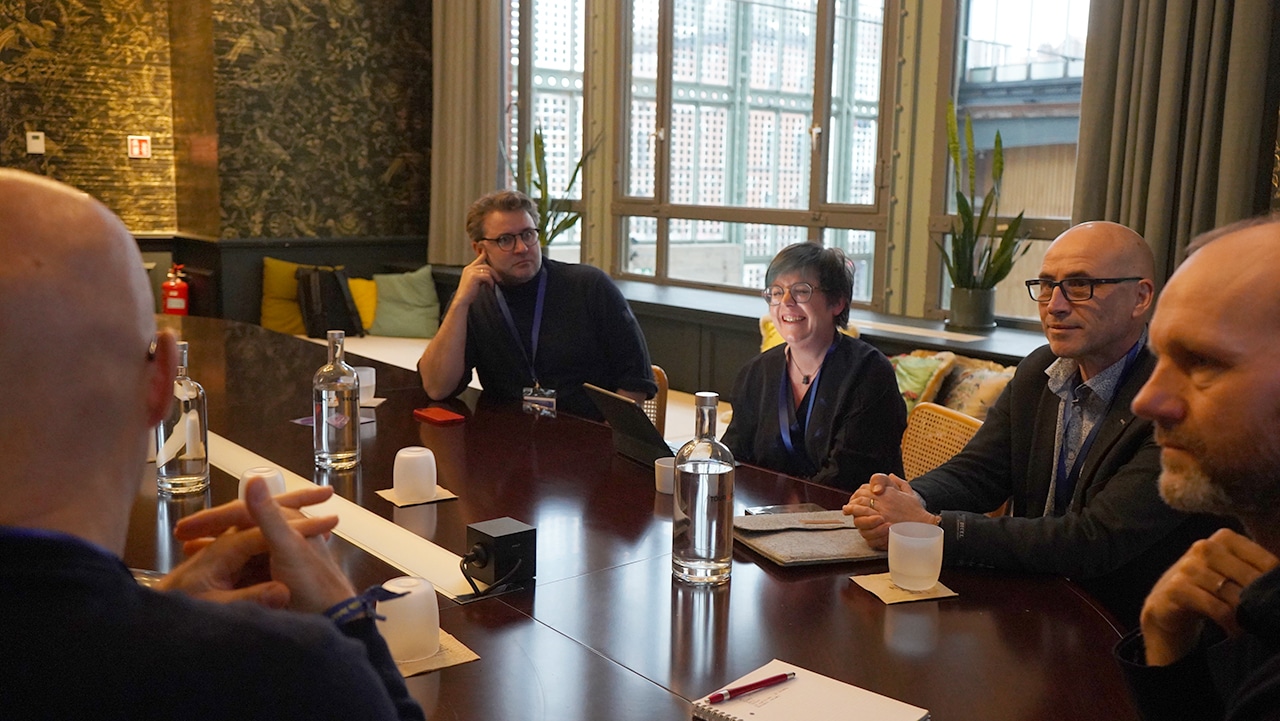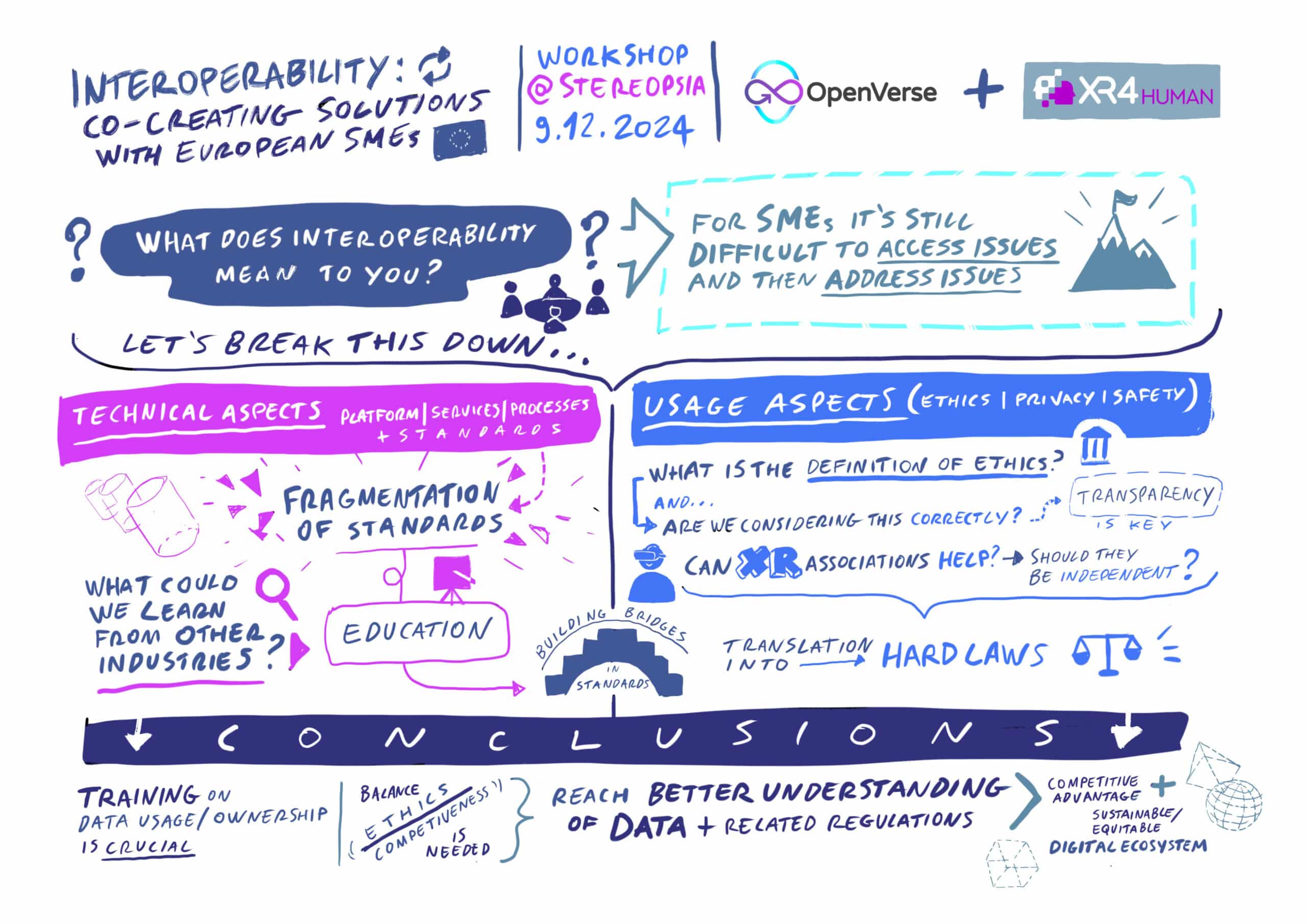OPENVERSE and XR4Human projects recently brought together industry experts, SMEs, and policymakers to tackle one of the field’s most pressing challenges: interoperability. The workshop ‘Interoperability: co-creating Solutions with European small and medium-sized enterprises (SMEs)’ organised by the two Coordination and Support Actions (CSAs) was held at Stereopsia 2024, an industry event hosted by ‘La Maison de la Poste’ in Brussels on 9 December. The workshop marked a significant step towards creating a more unified and ethical Virtual Worlds. Improving the future of Virtual Worlds where people and machines work together harmoniously with humans at the centre is fundamental. Additionally, gathering feedback from SMEs on the interoperability challenges they encounter is equally important.

Technical Interoperability – Platform, Services, Processes and Standards
The trends in open standards for extended reality (XR) are evolving rapidly, driven by both technological advancements and market pressures. However, the accelerating pace of innovation and economic incentives to be first to market often conflict with the slower process of establishing standards, which has traditionally served as a baseline blueprint for the advancement of a broad XR ecosystem. This tension affects the current state of interoperability within XR and across industries. Additionally, hardware cycles significantly impact the development process, as frequent updates and changes in hardware capabilities necessitate constant adaptations in software and standards. The rapid evolution of artificial intelligence (AI) also plays a crucial role, influencing processes and presenting similar interoperability challenges. Both XR and AI industries face common hurdles in achieving seamless integration, but they can mutually benefit from each other’s advancements in addressing these challenges. Understanding these dynamics is essential for navigating the complex landscape of XR development and standardisation. The purpose of OPENVERSE and XR4Human projects is to understand this process and help to improve them for the benefit of European SMEs.
Interoperability – Ethics, Privacy, Safety
As technologies and industries converge, there are rising implications for privacy, safety, and human security. Interoperability appears to be a crucial link in addressing these concerns. The example referred to, during the workshop, was the one of ‘Real-World Data’ (RWD): it refers to data relating to patient health status and/or the delivery of healthcare that is routinely collected from a variety of sources outside of controlled clinical trials.
Real-world data raised many ethical concerns about privacy and safety for the Virtual Worlds experts invited to the workshop. The engaging discussions also raised the importance of a thorough definition of ethics. Some XR creators said that if tools were available, they would use them without questioning if tools were ethical enough.
Another topic was fragmentation, which seems to have become the new norm, potentially influencing diversity and accessibility. Interestingly, interoperability is impacted differently depending on whether one is operating under EU law or US law. Another concern was the one around the embedding of network sensors and actuators into the physical world. It transforms the design and governance of cyber infrastructure into one of the most consequential geopolitical issues of our time. Not only does this challenge notions of freedom and power structures, but it also further blurs the roles of member states in addressing technical structures that inherently cross borders. As the Internet of Things (IoT) becomes increasingly integrated into everyday systems, lifestyles, and businesses, it generates a greater need for cybersecurity.
“By joining forces, initiatives like XR4Human and OPENVERSE are tackling one of the most critical challenges: enabling seamless interaction between diverse systems, platforms, and technologies. This collaboration underscores the EU’s commitment to fostering innovation that aligns with core European values—transparency, inclusivity, and sustainability. Together, these initiatives ensure that Virtual Worlds remain accessible and adaptable, empowering individuals and organisations to co-create immersive experiences that enhance human well-being while respecting digital sovereignty and ecological responsibility.” Francesco Mureddu, OPENVERSE Coordinator, The Lisbon Council
Conclusion

There were many outcomes following this engaging discussion around interoperability of Virtual Worlds. Educating SMEs about the current landscape of data usage and ownership is crucial. Many SMEs lack access to adequate funding and information, hindering their ability to compete effectively in today’s data-driven economy. To address this gap, education and training programs focused on data literacy and responsible data practices are essential. Finding the right balance between ethics and competitiveness is paramount, as companies must navigate complex regulatory environments while remaining innovative. The increasing importance of data provenance and transparency in data gathering methods underscores the need for SMEs to prioritise these aspects from the design phase onwards. Regulatory sandboxes offer valuable opportunities for SMEs to interact with policymakers and gain insights into applying for funding opportunities, such as those available in the European Union. Consulting with experts and industry associations can help SMEs ensure they meet ethical requirements and remain independent in their data management practices. Furthermore, understanding how data is being used and for what purposes is vital for informed decision-making. As the Corporate Sustainability Reporting Directive (CSRD) comes into effect, SMEs must be prepared to demonstrate transparent data practices and adhere to emerging standards in data governance. By prioritising these aspects, SMEs can not only comply with regulations but also leverage data as a competitive advantage while contributing to a more sustainable and equitable digital ecosystem.
About STEREOPSIA
Stereopsia is more than an event; it’s a catalyst for redefining human experiences through eXtended Reality (XR). As Europe’s foremost XR event, Stereopsia ignites creativity and innovation in an energetic, collaborative setting. With its roots in the 3D revolution of yesteryears (the event started in 2009!), Stereopsia remains at the forefront of technological evolution, steadfast in its commitment to pioneering research and innovation. At its core, Stereopsia fosters collaboration and cross-pollination among diverse audiences, driving XR adoption across Europe and beyond. Located strategically in Brussels, at the heart of European innovation, Stereopsia offers a panoramic view of the XR landscape, shaping the future of immersive technologies continent-wide.
About XR4Human
XR4Human is a three year EU-funded project which started in November 2022. Its mission is to co-create a living guidance on ethical and related policy, regulatory, governance, and interoperability issues of XR technologies whilst building public trust and acceptance and a strong and competitive ecosystem around XR technology for trade and industry, but in a manner that establishes trust among users and authorities.
About OPENVERSE
The vision of the OPENVERSE project is to create inclusive, open, and ethically responsible European Virtual Worlds, enhancing the European Union’s technological sovereignty in the global arena. Its strategy involves integrating diverse technological expertise, fostering collaborative innovation, and ensuring interoperability, privacy, and security in digital environments. OPENVERSE aims to lay the foundational framework for these Virtual Worlds, combining user co-creation with extended reality technologies, addressing legal and ethical challenges, and guiding future policy and industry standards for globally influential Virtual Worlds.
